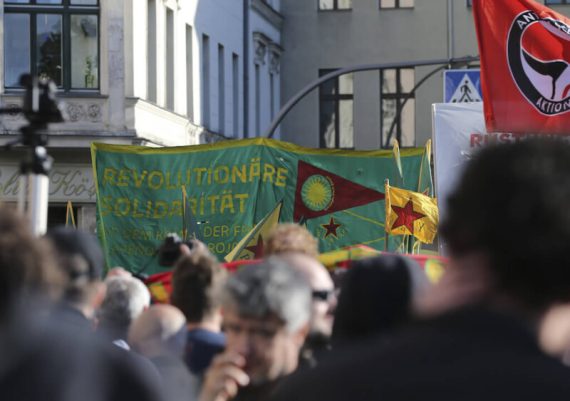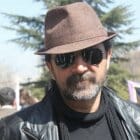N
ovember 28, 1978 is considered the PKK’s founding date. On this date, Abdullah Öcalan and his friends gathered in a house in the village of Fis in Diyarbakır and founded the organization. Eight months later, they declared their “official” establishment with an assassination attempt on Mehmet Celal Bucak, the leader of the state-loyal Bucak tribe and a member of parliament. In their founding declaration, in addition to colonialism and proletarian internationalism, they also addressed the issue of “independent Kurdistan.” Since then, the PKK and the Turkish left have always had an intricate relationship. Öcalan’s relationship with the Turkish left, however, goes back much further.
In the 1960s and 1970s, the peak of the Turkish left, leftist groups organized large demonstrations, trade unions orchestrated strikes, and labor movements became increasingly popular. Young people from the Turkish Workers’ Party (TİP) formed armed organizations and started to resort to acts of terrorism. Figures like Mahir Çayan, Deniz Gezmiş, and İbrahim Kaypakkaya were products of this period. Influenced by the Cuban and Vietnamese resistance against the United States, they received armed training in camps in Lebanon and returned to Turkey.
When guns started to be used, the era of bank robberies, kidnappings, and killings began. This period, which also saw the emergence of a left-right conflict, came to an end with the military memorandum of 1971. Leaders of illegal leftist organizations were killed, arrested, and executed, and the TİP was shut down. Those who could escape sought refuge in Europe.
Meanwhile, Öcalan was a land registry cadaster officer in his early 20s, preparing for university exams in Istanbul. When he moved to Ankara and enrolled in the Faculty of Political Sciences, he began to take part in the political debate. At the time, the 1971 memorandum had been declared and Öcalan was arrested during a protest against the killing of Mahir Çayan, the leader of the People’s Liberation Party-Front of Turkey (THKP-C). Along with his friends, Öcalan was put in Mamak Prison, Ankara. According to his own account, it was during this period that he became politicized, claiming that “prison became a school for him.”
With the 1974 amnesty, those who had fled abroad returned and the arrested members of the leftist group began to reorganize. Öcalan decided to drop out of school and form a Marxist-Leninist group to fight for an “independent Kurdish state” in southeast Turkey. From then onwards, the PKK has been the scourge, first, of the Kurds and, then, of the whole of Turkey.
In those years, as the country was rolling towards the 1980 military coup, Öcalan fled to Syria. The coup crushed all leftist organizations, but the PKK survived by keeping its headquarters in Syria. After the September 12, 1980 military coup, the PKK and the left first crossed paths in Germany. Through one of the leaders of the DEV-YOL (Devrimci Yol, Turkish for “Revolutionary Path”) who fled to Germany before the coup, the PKK deepened its ties to the left. The PKK joined the “anti-fascist front” formed there to gather leftists who had fled to Europe.
These groups first organized in Hamburg, Frankfurt, Cologne, and West Berlin, where the United States’ influence was felt most strongly. During this period, the PKK had strong ties to the German Greens Party and the Social Democratic Party. At that time, the Berlin Wall had not yet fallen, the Cold War was ongoing, and the city of Berlin was divided in two.
PKK-left collaborations
When the Eastern Bloc and the USSR collapsed in 1989-91, the ideological crisis of the Turkish left was unveiled. The remnants of the armed organizations of the 1970s united and formed political parties with some groups resuming illegal armed activity. The Öcalanists (Apocular in Turkish), who until then had been a “handful of marauders” in the eyes of the Turkish state, carried their bloody terrorist attacks against the state and civilians to a peak in the 1990s.
During this period, Öcalanists also experienced conflicts with some groups from the Turkish left. For example, they killed members of the Revolutionary Communist Party of Turkey (TDKP) in rural Dersim. At universities, they sometimes clashed with groups such as the Labor Party, the Revolutionary Left (Dev-Sol), and the Communist Party of Turkey (TKP) while they collaborated with other leftist groups. Smaller leftist political parties were also looking for leftist alliances to enter parliament. In the 1991 elections, MPs from the PKK-led HEP (People’s Labor Party, 1990–93) entered parliament through the Social Democratic Populist Party (SHP).
In the 2000s, the Turkish left was still very vocal, but was no longer taken seriously. These were the years when the left became a marginal cultural actor consisting of boutique organizations with no resonance in society, far from promising a future. Yet, the PKK despite its large Kurdish base and the fact that it is far larger and more influential than the entire left combined, still maintains close ties with the Turkish left.
For example, the Peoples’ Democratic Party (HDP) gives its co-chairmanship to the Marxist–Leninist Communist Party (MLKP), one of the small illegal organizations of the Turkish left, and makes cadres trained in leftist organizations deputies through its party, recruiting them to the party administration, and giving them important positions in NGOs, associations, trade unions, etc. In this manner, the HDP makes the left a partner. What is more, the HDP has established a formation called “United Revolutionary Movement of Peoples” (Halkların Birleşik Devrim Hareketi) together with small, illegal leftist organizations whose names only a handful of people could recognize. In academia, media, and civil society, the HDP mainly cooperates with leftist groups and individuals.
In the last decade, the HDP adventure has taken the PKK-left relationship to new levels. When the HDP was founded, Öcalan said, “I started this struggle with Mahir Çayan’s stance and his sympathies. For 40 years, I have been fighting on Mahir’s line. It is a trust that Mahir gave me, and I have tried to fulfill this trust in the best possible way with the dimension of struggle in 40 years. I am now handing over this trust.” He, thus, presented the HDP as a gift to the Turkish left. Indeed, Ertuğrul Kürkçü, the only survivor of the clash in which Mahir Çayan and his comrades were killed, later became the HDP’s co-chair.
When the 2013 Gezi Park protests erupted, the “Resolution Process” was underway. The PKK had started to move its militants out of the border area of Eastern Turkey and clashes had stopped with the promise of laying down arms. The HDP kept a distance from the protests. In fact, when Selahattin Demirtaş, the former HDP chairperson who is currently in prison, used the word “coup” for the uprising, he was lynched by the left for days. However, the insolent belief that the government would fall must have enveloped the PKK members as well because they stopped the withdrawal.
Many will remember the famous photographs during the Gezi Park protests: Öcalan posters placed next to Atatürk posters, the photo of a person holding a HDP flag and “protecting” a person carrying a Turkish flag from tear gas by pulling him by the arm, etc. The “time-honored” relationship with the left was reinforced without any challenges.
Since its foundation, the HDP has collaborated with many organizations of the Turkish left, both large and small. Even before it became a political party, the umbrella organization, the Peoples’ Democratic Congress, consisted of the PKK and its affiliates, as well as these left-wing parties and NGOs. After participating in this structure for a year, the HDP, which is now facing a closure case, was founded together with these groups.
Fifteen days after the foundation of the HDP, another party was founded along the same lines: the Greens and Left Future Party (Yeşiller ve Sol Gelecek Partisi). This party was formed by the merger of the Green Party and the then extant Equality and Democracy Party (Eşitlik ve Demokrasi Partisi). The two parties, which were mostly populated by liberal leftists, had a negligible membership, and enjoyed close ties with the West, especially Germany; from their very inception, they were on standby. They changed their name to the “Green Left Party” in April 2016 and announced that they would enter the May 14, 2023 elections under that name and not under the umbrella of the HDP. Members of the Green Left Party are carrying out electoral work under the “Labor and Freedom Alliance” (Emek ve Özgürlük İttifakı), taking with them small left-wing parties whom the vast majority of the general public have never heard of.
Today, the Turkish left is composed of marginalized individuals whose ideology is bankrupt across the world, whose utopia has collapsed, leaving them with nothing left to cling to, and who have confined their entire politics to the fierce defense of a vague term called “lifestyle.” The PKK, on the other hand, is an organization that has international support, can get 5-6 million votes, is nurtured and polished by the West, and which, for many years, has been able to put governments under great pressure by its use of terrorism.
The PKK, which used to be the left’s “half-brother,” now uses the left for whitewashing its image. It derives legitimacy from individuals and groups with a range of identities that are sympathetic to the Western public and often associated with the left. The most valid of these identities is, of course, secularism. The vast majority of the Turkish left now clings almost exclusively to the principle of secularism in the fight over “lifestyle.” This also serves as a key that opens doors for the PKK. The depleted left can pretend that it is still influential in the political life by melting into the PKK’s mass—a willing buyer and a willing seller are both present.
Recommended
The path from red to green
The Turkish left, once united under the banner of anti-imperialism and which contemplated the narrative of “making history” for half a century, is being towed by the PKK, which is heavily armed, trained, and is officially allocated funds from the state budget of the world’s largest imperialist power, the United States, which calls the PKK “our armed ground force.”
The PKK no longer has any precedent in the world: it kidnaps children in Syria and Iraq, and forcibly arms them against the military. Does anyone appear to care? It doesn’t seem to matter that the families of the children, whom the left still refers to as “guerrillas,” have been protesting against the PKK in front of the HDP headquarters for three years.
The shame of being the plaything of a structure that is at the center of all kind of filth from drug to human and arms trafficking, from extortion—even in Europe—to threats, from blackmail and arson, should be enough, but it is not. The left’s goal is to have the “religious” government defeated and to make the “secular lifestyle” dominant!
The Turkish left-PKK alliance had been “red” to this day. Now, it is being rebranded as green. The adventure that began with the Greens in Europe in the 1980s is entering a new phase. Does this not ring a bell? During the founding of the Greens in Germany there was also an attempt to give a new image to the defeated left: the environment instead of the working class, the green flag instead of the red one. Today, Annalena Baerbock, the co-chair of the German Greens (a position that was first introduced in Turkey by none other than the HDP), is Germany’s foreign minister.
However, while the German Green Party, for example, used to be in the political arena under the anti-nuclear, anti-proliferation, and environmentally conscious umbrella, today, it supports Germany’s largest military expenditure budget since World War II, the proliferation of nuclear power plants, and even the reopening of closed coal-fired power plants. Let’s see whether our Turkish left, whose red color is trying to shine again by turning green, will follow the same path.





